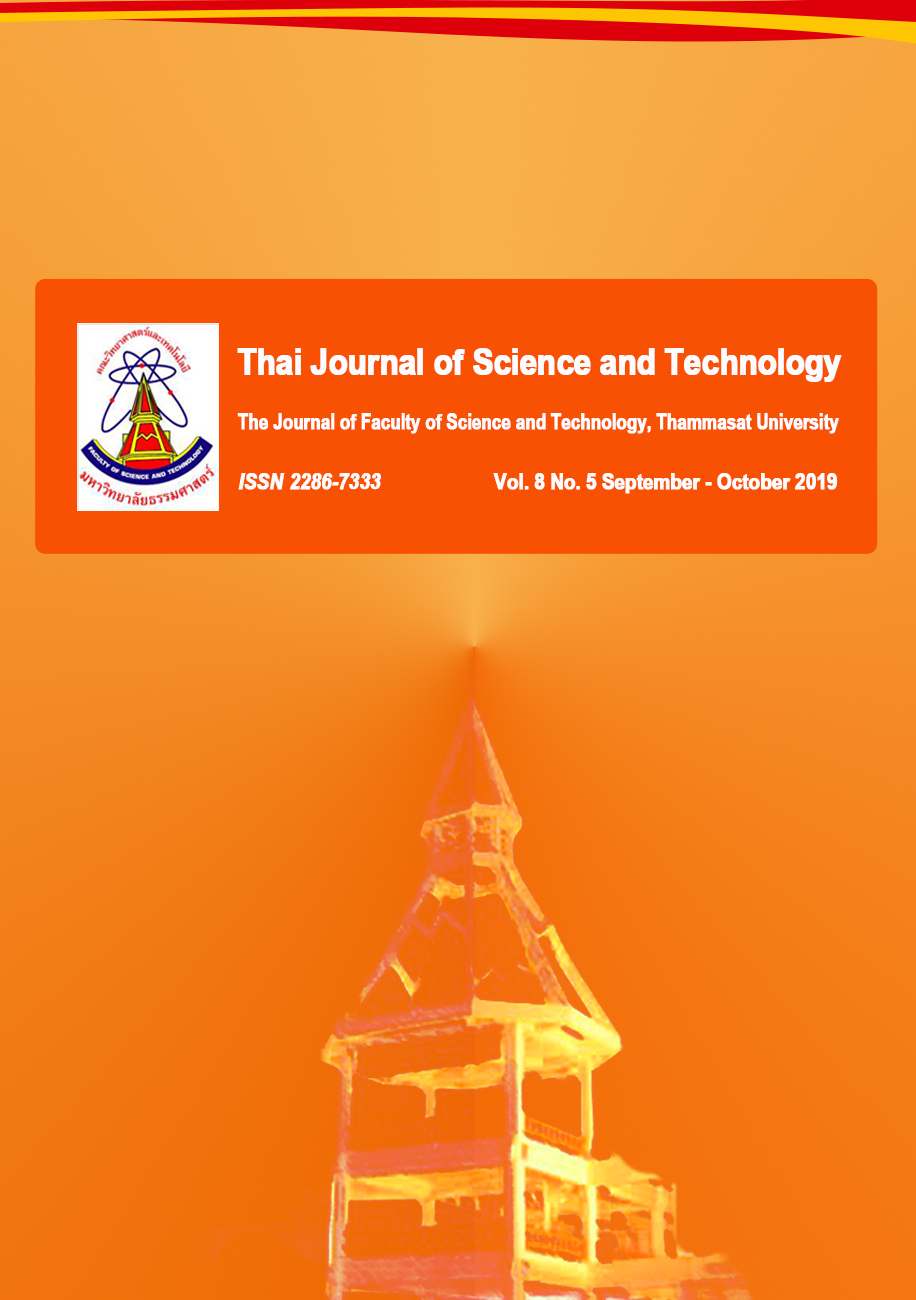การประยุกต์ใช้ระบบการรับรองแบบมีส่วนร่วมเพื่อส่งเสริมการเกษตรอินทรีย์ภายในชุมชนเกษตรกรรายย่อย
Main Article Content
Abstract
Abstract
The PGS (participatory guarantee system) organic lover group was founded since 2009 with 8 small grower members within the village to produce GAP vegetables. Subsequently, the group has increased to 15 grower members and has changed the production system to be organic farming. Only one member from 15 had been gained organic standard certified by third party certification body of IFOAM and Organic Thailand since 2014. Therefore, their vegetable product was not enough to supply their entrepreneur and consumers. The 14 grower members leftover also required the organic standard certification. Even though, one of the members who has passed the organic farm certification but the certification was covered only 1 year. Besides, organic standard certification for 15 grower members causes very high certification fee each year. PGS is a tool to drive the organic certification by farmer cross checking and monitoring within the community. After 2 years, PGS was applied to the group, the members were cross checked each other farm members and followed the process. We found that 14 grower members could pass organic farm certification by PGS process, and another one would pass in next year depending on crop type and a differential of transition period. It is a result of learning process and participation of farm monitoring made clear understanding and a strict following in the organic standard. This indicated that PGS was suitable for organic farming extension within small farmer community, which carried a little various organic products and promoted a strong sustainable community.
Keywords: PGS organic lover group; Chum Ta Bong; PGS; organic farming folk way; guarantee by the community
Article Details
บทความที่ได้รับการตีพิมพ์เป็นลิขสิทธิ์ของคณะวิทยาศาสตร์และเทคโนโลยี มหาวิทยาลัยธรรมศาสตร์ ข้อความที่ปรากฏในแต่ละเรื่องของวารสารเล่มนี้เป็นเพียงความเห็นส่วนตัวของผู้เขียน ไม่มีความเกี่ยวข้องกับคณะวิทยาศาสตร์และเทคโนโลยี หรือคณาจารย์ท่านอื่นในมหาวิทยาลัยธรรมศาสตร์ ผู้เขียนต้องยืนยันว่าความรับผิดชอบต่อทุกข้อความที่นำเสนอไว้ในบทความของตน หากมีข้อผิดพลาดหรือความไม่ถูกต้องใด ๆ
References
ณัชชา ลูกรักษ์, ดุสิต อธินุวัฒน์ และธีระ สินเดชารักษ์, 2556, ปัญหาและอุปสรรคในการปรับเปลี่ยนเพื่อการผลิตพืชผักอินทรีย์ของเกษตรกรจังหวัดราชบุรีที่ผ่านการอบรมโครงการพัฒนาระบบเกษตรอินทรีย์, Thai J. Sci. Technol. 2(2): 125-133.
ดุสิต อธินุวัฒน์, จินตนา อินทรมงคล, สมชัย วิสารทพงศ์, ปริญญา พรสิริชัยวัฒนา และลักษมี เมตปราณี, 2559, มาตรฐานเกษตรอินทรีย์แบบมีส่วนร่วม คืออะไร?, Thai J. Sci. Technol. 5(2): 119-134.
ธำรง พันธุตะ, 2550, การพัฒนาเกษตรอินทรีย์ของกลุ่มเกษตรกรผู้ปลูกผัก หมู่ที่ 5 ตำบลห้วย ทราย อำเภอหนองแค จังหวัดสระบุรี, วิทยา นิพนธ์ปริญญาโท, มหาวิทยาลัยราชภัฏเทพสตรี, ลพบุรี.
บุญธรรม จิตต์อนันต์, 2540, ส่งเสริมการเกษตร, พิมพ์ครั้งที่ 2, มหาวิทยาลัยเกษตรศาสตร์ กรุงเทพฯ.
มูลนิธิเกษตรอินทรีย์ไทย, 2558ก, มาตรฐานเกษตรอินทรีย์แบบมีส่วนร่วม, กรุงเทพฯ, 28 น.
มูลนิธิเกษตรอินทรีย์ไทย, 2558ข, แนวทางการตรวจเยี่ยมฟาร์มเพื่อนในระบบการรับรองแบบมีส่วนร่วม, กรุงเทพฯ, 23 น.
ยิ่งศักดิ์ ไกรพินิจ, ธีระวัฒน์ จันทึก และพิทักษ์ ศิริวงศ์, 2560, การจัดการการเกษตรสมัยใหม่ของประเทศไทย, ว.วิจัยและพัฒนา วไลยอลงกรณ์ ในพระบรมราชูปถัมภ์ 12(2): 115-127.
ฤทัยชนก จริงจิตร, 2556, เจาะลึก “Smart Farmer” แค่แนวคิดใหม่ หรือจะพลิกโฉมการเกษตรไทย, แหล่งที่มา : http://tpso.moc.go.th/img/news/1074-img.pdf, 8 มีนาคม 2560.
สมาพันธ์เกษตรอินทรีย์นานาชาติ, 2558, ระบบการรับรองอย่างมีส่วนร่วม : กรณีศึกษาจาก บราซิล อินเดีย นิวซีแลนด์ อเมริกา ฝรั่งเศส, สำนักพิมพ์สวนเงินมีมา, กรุงเทพฯ, 112 น.
สรธรรม เกตตะพันธุ์, กฤติเดช อนันต์, ดุสิต อธินุวัฒน์ และลักษมี เมตปราณี, 2561, ผลของการใช้ระบบการรับรองแบบมีส่วนร่วม (พีจีเอส) ในชุมชนเกษตรอินทรีย์, Thai J. Sci. Technol. 7(4): 333-354.
สำนักงานมาตรฐานสินค้าเกษตรและอาหารแห่ง ชาติ, 2552, มาตรฐานสินค้าเกษตร มกษ. 9000 เล่ม1-2552 เกษตรอินทรีย์ เล่ม 1 : การผลิต แปรรูป แสดงฉลาก และจำหน่ายผลิตผลและผลิตภัณฑ์เกษตรอินทรีย์, กระทรวงเกษตรและสหกรณ์, กรุงเทพฯ, 41 น.
สำนักงานมาตรฐานสินค้าเกษตรและอาหารแห่ง ชาติ, 2554, มาตรฐานสินค้าเกษตร มกษ. 9000 เล่ม 2-2554 เกษตรอินทรีย์ เล่ม 2 : ปศุสัตว์อินทรีย์, กระทรวงเกษตรและสหกรณ์, กรุงเทพฯ, 31 น.
อภิชาติ ใจอารีย์, 2561, แนวทางการขับเคลื่อนเกษตรอินทรีย์เพื่อสร้างความมั่นคงด้านอาหารปลอดภัยสำหรับชุมชน : บทสะท้อนจากภาคปฏิบัติการ, ว.มหาวิทยาลัยศิลปากร 3(5): 1-17.
Chandra, K., 2014, The global PGS newsletter IFOAM: PGS India- PGA operated by the government of India 4(8): 1-8.
FAO/WHO Codex Alimentarius Commission, 2007, Guidelines for the production, processing, labeling and marketing of organically produced foods, CAC/GL 32-1999, Rome.
FAO, IFOAM and UNCTAD, Summary Report International Task Force on Harmonization and Equivalence in Organic Agriculture 2003-2008, Available Source: http://r0.unctad.org/trade_env/itf-organic/meetings/itf8/ITF_Summary_ Report_081216db_%2 0final.pdf, Feb. 9, 2016.
IFOAM, International Federation of Organic Agriculture Movement: Principle of Organic Agriculture, Available Source: http://www. ifoam.org, March 4, 2009.
IFOAM, The Full Diversity of Organic Agriculture: What we call Organic, Available Source: http://www.ifoam.org/press/positions/full-diversityorganic-agriculture.html, February 1, 2013.
IFOAM, PGS, Available Source: http://www.ifoam.org/about_ifoam/standards/pgs.html, May 14, 2014.
IFOAM, Policy Brief: How Government Can support participatory guarantee system, Available Source: http://www.ifoam.bio/sites/default/files/page/files/policybrief-howgovernmentscansupportpgs_0.pdf, February 21, 2015.
IFOAM, ORGANIC 3.0 for Truly Sustainable Farming & Consumption, Available Source: http://www.ifoam.bio/en/organic-policy-guarantee/organic-30-next-phase-organic-development, February 9, 2016.
ISEAL, P035 ISEAL Common Requirement for the Certification of Producer Groups, Public Version 1, November 2008, Available Source: http://www.isealalliance.org/resources/p035-iseal-common-rqmts-for-produce r-group-cert-v1-nov08, March 11, 2009.
UNCTAD, FAO and IFOAM, 2012, Guide for Assessing Equivalence of Organic Standards and Technical Regulations (EquiTool) Version 2 by Global Organic Market Access.
UNCTAD-UNEP CBTF, Best Practices for Organic Policy – What developing country Governments can do to promote the organic agriculture sector, Available Source: http://www.ifoam.org/growing_organic/cbtf_bestpractices_ unep_unctad.php, February1 9, 2016.


